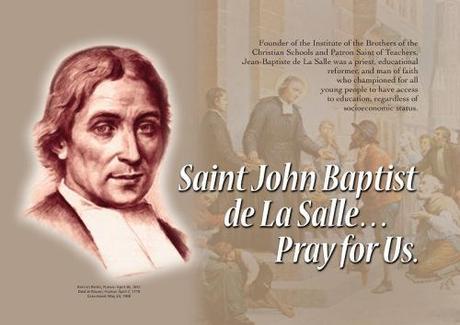
Today, the universal church celebrates a very great man, St. John Baptist de la Salle, patron of teachers and founder of the Christian Brothers.
John was born as the eldest son to a well-to-do aristocratic family on April 30, 1651, in Rheims, France. He received the rank and wealth of his family, setting him apart from the extensive poor people who resided in France. When he was 16 years of age, he pursued studying the classics at the College des Bons Enfants, becoming the canon of Rheims. He had planned a career in the Church, studying also at Saint Sulpice and the Sorbonne to become a priest, being ordained as one at the age of 27.
He was asked to help start some “charity” schools in Rheims, wherein he had to supervise the teachers, bring them into his home and educate them. John finally realized that everything he was doing was coming from God, from “Providence,” to begin a recognized mode of Christian education for the poor, those individuals who could not afford to pay for an education. His goal was to do the Will of God and he thus understood this purpose for the long-term.
Accordingly, John gave away his wealth and his rank as canon, so that he would be also poor, like the people he served. In 1684, he founded a religious group called the “Brothers of the Christian Schools,” comprised of the schoolteachers he trained, otherwise known as the “Christian Brothers” or the “De La Salle Brothers.” This order thrived, continuing on through the present time all around the world. The order’s purpose is solely to teach. Hence, the rule was and still is, that no brother might become a priest and no priest might join the order.
John and the brothers lived in great hardship, but did so cheerfully with their fiery purpose of teaching the poor ever before them. John made as his priority, the religious and professional training of his brothers. However, he surmised because of the demand for his teachers, that he had to form secular schoolmasters also. Thus, in 1687, he started a training college for approximately 40 young people, which was the first such institution in the history of education.
He opened schools in other neighboring towns around Rheims and in 1683, he went to Paris to direct a school in the parish of St. Sulpice, where he established his headquarters. The brothers were now teaching 1,100 individuals. In Paris, he founded yet another charitable school for youths who were also employed.
Of course, where there is success, there is also jealousy and envy. Lawsuits were filed against him by teachers of other schools whose pupils were paying students. His charitable schools were pillaged and he was precluded to open any other training colleges or charitable schools anywhere else in Paris. Some of his brothers defected and he received opposition from secular schoolmasters who resented his methods and techniques of teaching. But, thank God his brothers were well-established in other areas of France, in Marseilles, Calais, Boulogne, Mende, Grenoble, Troyes and other places. He also received intense opposition from the Jansenists, wherein John had no use for their moral rigidity or pessimistic outlook of humanity; he had to oppose these people the rest of his life.
Indeed, in Rouen, he founded a boarding school for the sons of the rich and noble, a fee-paying establishment. These individuals desired to receive an excellent education superior to the primary school, but also being educated in the practical aspects of life, instead of just the classics. He also formed in Rouen a reform school for young delinquents which thrived, being a model for modern schools of a similar purpose.
John spent the rest of his life in Rouen, writing the Rules for his brothers and writing Meditations. He was afflicted with asthma and rheumatoid arthritis, dying on Good Friday in 1719 at the age of 68. He was canonized by Pope Leo XIII on May 24, 1900, and in 1950, Pope Pius XII named him the patron saint of schoolteachers.
Clearly, St. John lived the standard: do what you are supposed to do, when you are supposed to do it, and in the manner it is supposed to be done. He knew he was doing God’s will and he carried out his mission with enthusiasm, intensity and courage, helping students, both poor and rich, providing them with a superior education, and teaching his brothers successful methods in educational endeavors. He fought the Jansenists fiercely and defended and upheld the Gospel message of Our Lord Jesus Christ.
Let us remember St. John’s life and example of fierce holiness, desiring at all times to do the will of God, which is the supreme goal of any saint. We wish you a Happy Feast Day dear St. John Baptist de la Salle! Please pray for us and help us!
Respectfully,
Joan
Sources: Franciscan media; EWTN; Vatican website

